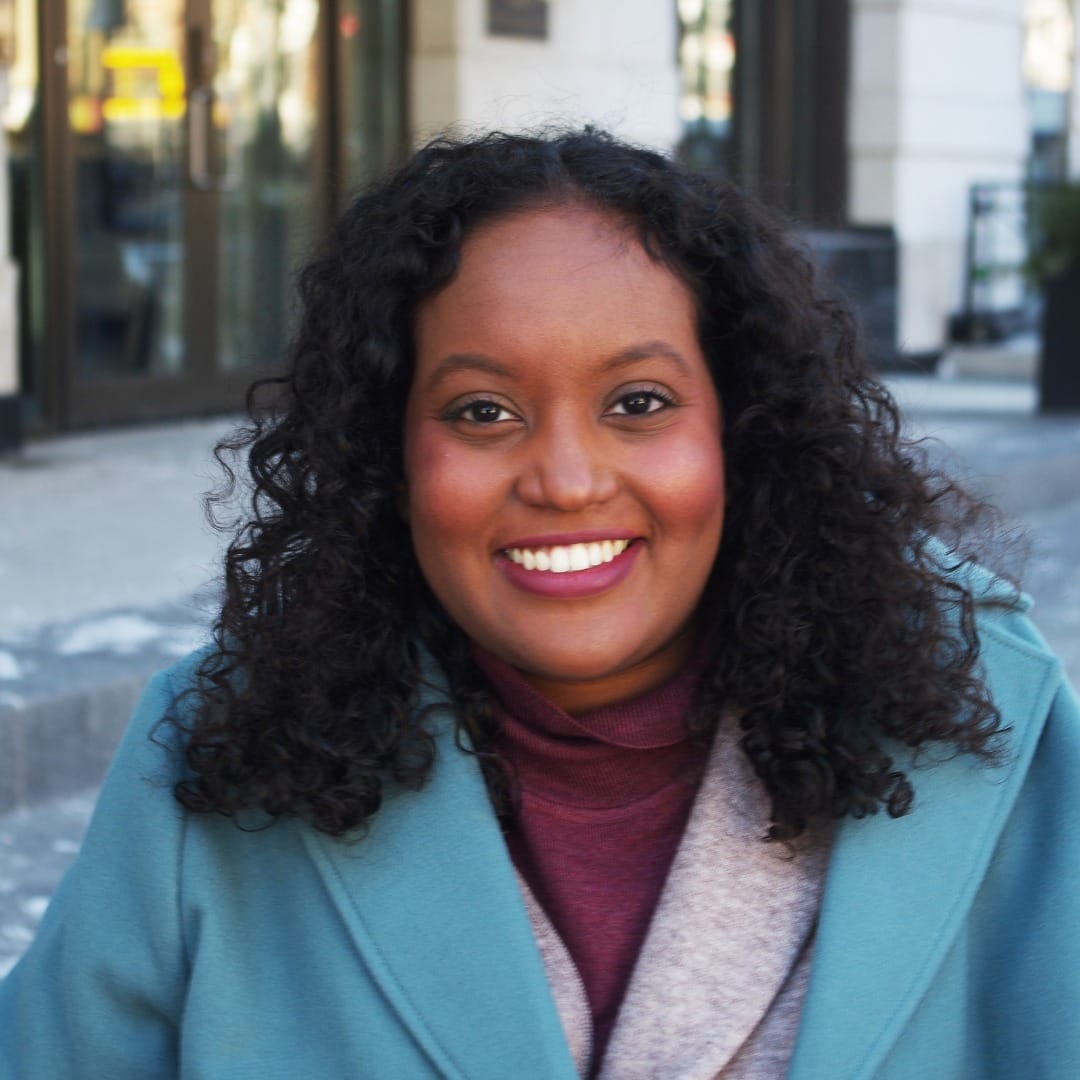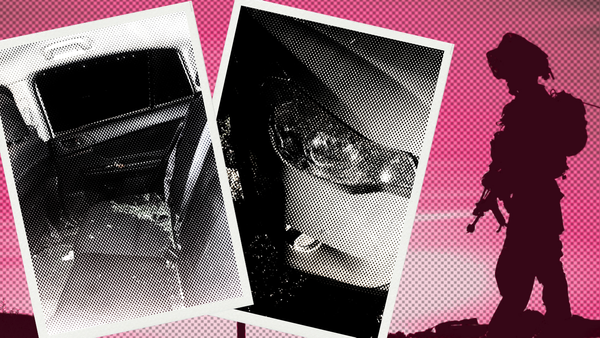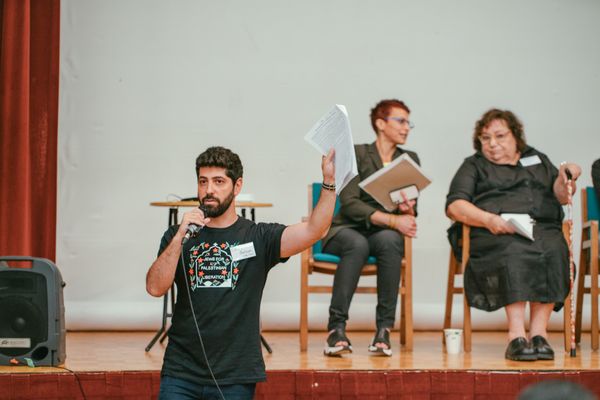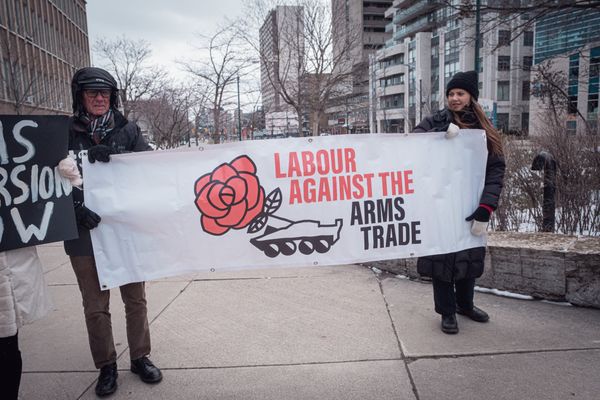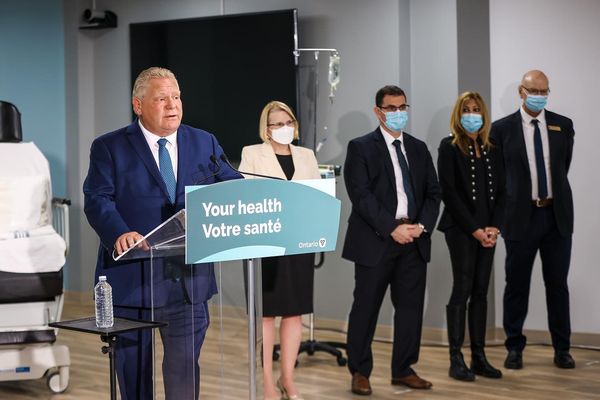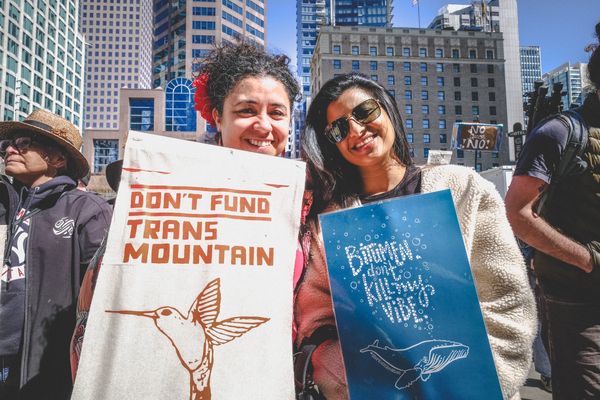On Oct. 10, 2023, three days into Israel’s brutal war on Gaza that followed a Hamas-led attack on Israel, Ontario MPP Sarah Jama published a statement calling for an immediate ceasefire. The statement also condemned Israel’s decades-long occupation of Palestine, Israel’s system of apartheid and its systematic violations of Palestinian human rights.
The next day, Jama apologized for “the pain that many Jewish and Israeli Canadians, including my own constituents, must be feeling,” and condemned both Hamas’ actions and Israel’s massive bombing campaign, which to date has killed more than 29,000 Palestinians and resulted in allegations of genocide being brought against Israel at the International Court of Justice (ICJ). Jama said in October that “there is no military solution to this conflict.”
On Oct. 23, 2023, the Doug Ford government voted to censure Jama, after she refused to verbally apologize for and delete her original statement. She was also kicked out of the Ontario NDP Caucus.
Since then, Jama has been sitting as an independent MPP. In the following interview, The Maple spoke to Jama about her plans for the new legislative session as an independent, her thoughts about the NDP, and the possibility of creating spaces for left-wing politics that exist independently of the party.
The interview has been lightly edited for length and clarity.
Alex Cosh: You’ve been back in the media lately, and there’s been a focus on two key motions that you’re bringing forward in the Provincial Parliament of Ontario. Tell us about those motions, and some of your other plans for the upcoming session as an independent MPP.
Sarah Jama: Over the last three months, since I became an independent member, I’ve been focused really deeply on my community. We’re still knocking on doors; we have a very active riding association with about 60 members; we raised about $35,000 for the riding association without much of a financial push.
Hamilton-Centre is the poorest riding in all of Ontario. It’s a very working-class city. So the issues folks care about the most right now are kind of obvious, but I think our approach will be a bit different: On housing, health care, education and social assistance. 60 per cent of people in my riding are renters. So my plan for this session, which starts [today], is to work very closely with community groups, to table legislation, but also to use my platform to explain how we got here, as a province, and to really just make sure that my platform exists to amplify work that other folks are already doing.
So with that being said, I reached out to the ODSP Action Coalition, and they said there are two things we want to see right now, beyond the conversation of doubling Ontario Disability Support Program payments. One is we want to see the housing benefit portion of ODSP tied to the average market rent in the city that a recipient resides in, because it’s one thing to just say we should increase the amount, but it’s another thing to say the amount should be livable no matter where you live.
The second piece is making sure that ODSP is not clawed back just because of who is in your household, or what kind of intimate relationships occupy your personal life. You often see folks who are disabled and get married, and then they get half of their income clawed back because there’s this weird, outdated idea that the person you marry is supposed to take care of you as a disabled person. And that’s not true. We know from studies written by the Disabled Women’s Network of Canada that disabled women very specifically are more likely to experience sexual, emotional and financial abuse. And so making this change so that your ODSP is not tied to who you’re with is one step to protecting women from gender-based violence.
We’re going to put forward more things in the future around social-systems reform that are needed, and so far, it looks like the Greens are supporting it. The NDP said they’re willing to work together and the Liberals said they’re discussing it in their Caucus meeting. So what that tells me is when we put forward ideas that are good for my community, that has the ability to push others into supporting good ideas, too. So I’m excited about what that means for my other plans around air quality, because Hamilton-Centre has some of the worst air-quality issues in the city.
AC: It’s great to hear that other parties are willing to at least talk with you about some of these motions. Obviously, this is coming in the context of a Conservative majority. But are you optimistic that these motions will at the very least be talked about in the other parties?
SJ: I don’t know. Clearly, I can’t debate [because of the censure], but I’m not too worried about that, because the Ford government never listens to anyone except for themselves anyway. And in most of the debates, we’re staring at empty chairs across the aisle. So a lot of debating motions is super performative. But it’s nice to see that the independents as well as the Opposition folks who agree with me are willing to work on this issue and other issues.
AC: As you mentioned, this is also going to be coming in the context of you being censured. What does this actually mean in practice? And how does this impact your ability to be a voice in the legislature and to represent your constituents?
SJ: So for context, October 7 happened. And then I waited three days. I thought that was even too long, because for anybody who was paying attention to what was going on at the time, by day three, you could see that the Rafah border was closed, white phosphorus was being used. Food and water weren’t allowed into the region. You could tell what was about to happen; that Israel, at that time, had genocidal intent.
So I looked around, and I saw that every other political leader in this country was saying that Israel had the right to defend itself, devoid of any context in terms of what was going on in Palestine. I’ve helped the [Boycott, Divestment, Sanctions] pass on my campus. I thought it was important to say something. I think the act of being censured for putting up the statement, calling for an immediate ceasefire, on Twitter and Instagram, was completely ridiculous, and completely about political theatre. It had nothing to do with what I actually said in my statement.
If you listen to the eight hours of debate about my statement, the Conservatives spent all of their time talking about decorum and me being a terrorist sympathizer without actually naming what I said in my statement. It sets a really terrible precedent that a majority government can just take someone’s right away to speak, using the censure process, even though censures are typically used to police the behaviour of someone in the house. This was about a thing outside the house, about something, they argue, we don’t even have jurisdiction over as a province.
As I said, I come from a riding that is the poorest in the whole province. I’m also one of the very few elected Muslims [in the Ontario legislature].
These are people who constantly tout their right to speech and the right to say and do whatever they want to do for the good of the people. And then the minute it’s afforded to them, they don’t like what someone’s saying, or they disagree with what someone is saying, they can just take away that voice.
It’s before the courts; my first hearing date is on the 22nd, and I have intervenors on my behalf: The Canadian Civil Liberties Association, as well as a second group of intervenors — which is Independent Jewish Voices - Canada, the Jewish Faculty Network of Canada, and the Arab Canadian Lawyers Association. They will all be arguing that the courts have the right to weigh in. We’re not at the judicial review argument yet.
We’ll see where this ends up. I’m very hopeful that on the heels of the prime minister finally uttering the statement ‘we need a ceasefire’ that the censure will be overturned. And if it doesn’t, it’ll definitely get overturned when I’m re-elected in 2026. Until then, I’m able to still vote; I’m able to still participate in committee, which is where the bulk of legislative work actually happens. I don’t get my 30 second clip for Question Period, but that doesn’t mean I can’t do the job.
AC: Of course, you weren’t only censured; you were also kicked out of the Ontario NDP Caucus. Can you walk us through what happened there?
SJ: I think a lot of what was made public should have been handled internally.
October 7 happened, and then I was watching very closely, as I tend to do. I have a history doing work supporting Palestinians, and I believe in a free Palestine. So that’s not new to anybody who elected me in my riding, or anybody who has worked with me as an organizer. This is not new information to the party, either.
I watched every political leader in the country use the very dangerous language of Israel having the right to defend itself, and in the back of my mind, I was asking myself the question, ‘to defend itself against what?’ By day three, I was waiting to see if anyone who had put out statements about Israel was going to say anything about the right for Palestinians to exist, and access food and water, and to not have their houses decimated.
At the same time, Palestinians in my riding were sending me very long emails about their families being stuck under the rubble. And I had meaningfully tried to engage with [NDP] staff saying, ‘I would like to put something out. Can you work with me on what I’m going to put out?’ There was a lot of back and forth and constant rhetoric around strategy, and there is this idea that permeates across the party that there are some issues that don’t matter to everyone, and therefore we shouldn’t weigh in on them.
And at some point, I was like, you can see the genocidal intent. I’m getting letters from people in my riding; I understand how y’all calculate risks, but I think we need to show political courage; we need to show that political strategy doesn’t always have to supersede decisions based on morality. So that was the crux of the back and forth between myself and the staff.
What I didn’t anticipate was the ways the public was used to have these internal conversations, or the government censuring me, I didn’t anticipate that either. I really thought that I would look around and other people would be saying the same thing, too, not that I would be one of the first in the country. I got a lot of death threats; I got a lot of rape threats. I actually had to go into hiding for a bit. So it was a terrible time.
The censure debate happened for eight hours. I watched it from home. And one of the stipulations of the censure was that in order to undo the censure, I should apologize for what I said, which essentially called for an immediate ceasefire, and asked folks to question settler-colonialism and the narratives that were being perpetuated about Palestine. I even quoted the United Nations in my statement.
To apologize for that would have meant to agree to what Ford was saying at that time when he said that I was supporting the beheading of babies and the raping of Israeli women, which is wholly untrue. It would have meant that I don’t stand by what I said. So I didn’t apologize.
I don’t know exactly why I was kicked out [of the NDP Caucus] because no one really had that conversation with me. I found out the same way everybody else did, which was in an email minutes before it happened, and minutes before the censure vote.
I think it had a lot to do with, from what I gather, people feeling like I was operating as an individual without also taking into consideration that this issue wasn’t an issue of individuals. We’re talking about whether or not to comment on genocide happening.
So after that happened, I went into hiding; I kept my head down. I didn’t really do interviews, but I listened to a lot of the rhetoric that was perpetuated about me, that had to do with me being difficult or had to do with me being new, and discounted a lot of my experiences. Before this job, I was the executive director of an entire organization. I was a sessional instructor at McMaster University. I’ve been able to work with teams. It wasn’t a question of me being difficult. It was a question of me being willing to sacrifice saying the right thing to make other people comfortable for a short amount of time, and then not being able to sleep at night.
People said that I made others unsafe by my statement. But really, I was the one who felt unsafe. I literally disappeared after the fact; I didn’t even participate in the censure debate that was about me. I’m glad that it’s behind me.
AC: Anyone who knows anything about the way Israel conducts itself knew, as you mentioned, very early on what was coming after October 7. There was obvious genocidal rhetoric from Israeli officials, from Israeli media, from Canadian media. The fact of the matter is, if people in power had listened to you and other voices who were calling for a ceasefire at the time, nearly 30,000 Palestinians would still be alive. What are your feelings about the NDP right now?
SJ: I think there are individuals in the party who really get this issue. In my riding, for example, there’s MP Matthew Green. We collaborate a lot. He actually went to Palestine, to see for himself, recently, what was going on, and has really, really moved the federal party along on this issue very specifically. And I’m seeing a lot of good work coming out of [NDP Foreign Affairs Critic] Heather McPherson as well, who also went to Palestine, too. I think that since then, her language has gotten so strong.
What I would like to see are things that exist in almost every left-wing party. In talking with [former leader of the British Labour Party] Jeremy Corbyn, at least there’s a clear mechanism for how MPs can dissent within their party and have difficult conversations. We don’t have those structures in place. So as much as people keep saying conversations are important, there’s no mechanism to actually be able to dissent as an MPP within our party.
Secondly, there’s no appeal process for when people are kicked out of their party. I think there are very structural changes that need to happen to save the party, and I don’t think those two things are difficult asks.
Until then, I’m going to be just doing my best to operate independently. But yeah, there are very real structural changes that need to be made. I’m leaving the door open for some of these reforms to be taken up within the party. On a provincial level, I just haven’t heard back from anyone; there’s not really been a conversation internally about what happened and where to go from here. Until then, I’m putting my head down and I plan to run regardless of having a party or not.
AC: It sounds like you’re open to the idea of reforming the NDP, but also, it seems like what you’re doing right now, and what you’re focused on doing right now, is your work as an independent. Is part of that work trying to foster the ability to imagine doing leftist politics outside of the NDP?
SJ: I definitely think that it should be possible for people to exist independently. We see that a lot in other countries. Canada is not really set up for that. But it doesn’t mean it shouldn’t be possible. I’m excited to test that out and see where this goes in my current role as an independent. But again, I think the bigger threat in this conversation is Doug Ford. He’s decimating our healthcare system. He’s decimating any chance we have of a real climate justice policy. He is the most ineffective premier this province has ever seen, and wastes a ton of money. So I do think it’s important to challenge him before more lives are lost. He will set a precedent in terms of how other provinces are treating their people.
I think the system is not set up for a good way to challenge someone like Doug Ford. I’m not shutting the door to working with anyone. We’re willing to work with anyone who’s willing to collaborate and have conversations, and we’ll see where that goes. I don’t have an honest answer in terms of if outside [the NDP] is better, or inside. But what I do know for sure is I’m not taking back my statement. And I won’t shy away from making other important statements as well. I’m going to continue to operate, and how everyone chooses to address themselves around that is up to them.
I didn’t kick myself out of the party. It shouldn’t be on me to create stipulations for how to re-enter. So until such a time that people want to have real, adult conversations in terms of what’s good for the province, I am going to continue to conduct myself as an independent and do this job the best that I can with the resources that I do have. I really do want to do this job well and represent people in my riding who feel super marginalized for a variety of different reasons.
I’m trying not to make this about personalities, because the one thing I do regret out of this whole situation is how much airtime me putting up a statement took from Palestinian voices at the time. So many interviewers were just talking about my statement, but not talking about what was going on in the region, or even interviewing Palestinians. That’s something that I need to do better going forward, is making sure to centre Palestinian voices. But again, I’m not going to shy away from making difficult statements. And I think I would like to have a political home in terms of a party, but I don’t know what that looks like or what that means.
AC: It sounds like the ball is in the NDP’s court, I guess. Maybe it’s more helpful to think of this as a test for the NDP, rather than for you. You’re willing to work with them, and the question is now: Are they willing to reciprocate that? Would that be a fair assessment?
SJ: I think so. I think everyone else needs to decide how they want to deal with or interact with me. And until everybody decides what it is they want to do, I’m just putting my head down and doing the work, regardless.
To win the nomination [to run for the NDP], I signed up, along with my friends and comrades, 600 members within a couple of weeks to be members of the NDP, and handed in those memberships. And it was one of the most successful and fastest membership drives of that scale that Hamilton-Centre has ever seen. And most of the people that we signed up were new to the party.
I think there is interest in engaging with these political systems. I wasn’t headhunted by the NDP. The community decided that I should be here in this political role to fight Doug Ford on key issues that impact the riding.
AC: You raised that big membership growth that your campaign brought in. I’m reminded somewhat of Anjali Appadurai’s campaign for leadership of the B.C. NDP in 2022, and how she attracted thousands of new members to her campaign. It seems that this is an approach of making the party a home for people who otherwise don’t have a political home.
SJ: I think so. There are many people who would feel at home in the NDP. But I think the structural changes that I’ve mentioned would make it easier for folks who don’t always agree within Caucus to be able to have meaningful conversations.
The structural changes that I’ve recommended will help create a space that’s navigable to new folks and to new members down the line.
I worry about extracting ourselves at this moment from political spaces entirely. I worry about people saying they’re never going to vote again. There’s just too much at stake to not try to engage in these systems as a form of harm reduction. I’m someone who grew up on ODSP for most of my life. I think it does people who are the most at a disadvantage in our communities a disservice if we’re all like, nah, bro, there’s no point in voting because the whole system’s broken. Well, what are we going to do about it?
Let’s opt out if that’s the only option. If there’s a way to work with people, let’s do that.
I refuse to feed the narrative that I’m difficult to work with. At the end of the day, I’m an organizer. I’m willing to try to figure out the best way to head into 2026, because regardless of all the personalities, one thing we can all agree to is that Ford is completely dangerous for this province. And we can’t afford another four years of that.


